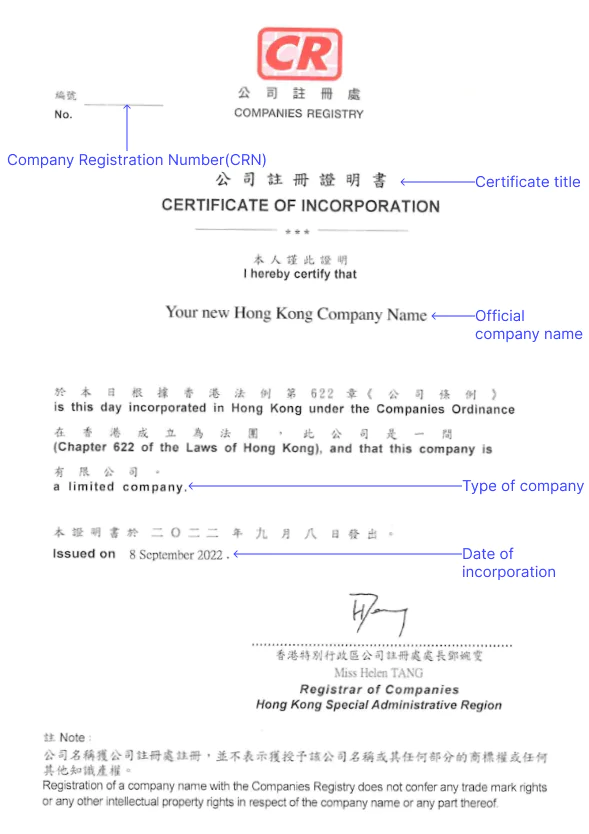
- Introduction to the Certificate of Incorporation in Hong Kong
- What details are included in the Certificate of Incorporation?
- How to get a Hong Kong Certificate of Incorporation
- Is the Certificate of Incorporation similar to the Business Registration Certificate?
- How To Verify the Authenticity of Certificate of Incorporation in Hong Kong?
- BBCIncorp’s Comprehensive Incorporation Services in Hong Kong
- To wrap up
To legally operate in Hong Kong, your company must be registered with the Companies Registry and obtain essential certificates. Among these documents, the Certificate of Incorporation holds a pivotal role.
What does this certificate represent, and what steps should you follow to obtain one for your Hong Kong business? Throughout today’s article, we will examine these aspects, from the information provided in the document to the entire attainment process.
Introduction to the Certificate of Incorporation in Hong Kong
What is a Certificate of Incorporation in Hong Kong?
The Hong Kong Certificate of Incorporation (CI) is a legal document that confirms the existence of a company within the jurisdiction, issued by the Companies Registry upon successful incorporation under the Companies Ordinance.
Notably, this certificate adheres to a standard design, and the text displayed is written in both English and traditional Chinese.
Why do you need your Certificate of Incorporation in Hong Kong?
Your Certificate of Incorporation provides legal proof of your company’s existence and forms the basis for starting a business and operating within Hong Kong’s business environment. It confirms your business identity and supports a range of legal and administrative activities.
Financial institutions, government bodies, and potential partners often request the CI to verify your company’s legitimacy. Without it, your operations may face delays or obstacles in key business processes.
Common situations where the certificate is required include:
- Opening a business bank account
- Entering contracts and forming partnerships
- Meeting regulatory and compliance obligations
- Applying for business licenses or permits
- Filing documents with government authorities
Understanding the role of this certificate shall let your business remain prepared and compliant in every stage of its operations. Now, what kinds of information should such an important document contain? Let’s move on to our next section.
Who must register for a Certificate of Incorporation in Hong Kong?
If you intend to operate as a legal entity with full corporate rights in Hong Kong, obtaining this certificate is not optional. It is the legal foundation of your business identity. Here are the cases of which entity must and doesn’t have to obtain a Hong Kong certificate of incorporation.
Limited companies must register
Any business that chooses to incorporate as a separate legal entity under the Companies Ordinance (Cap. 622) must obtain a Certificate of Incorporation. This includes private limited companies, public companies, and companies limited by guarantee. The certificate is issued by the Companies Registry and serves as official proof of legal existence.
Sole proprietorships and partnerships are exempt
Businesses operating as sole proprietorships or partnerships are not required to register for incorporation. Instead, they only need to apply for a Business Registration Certificate with the Inland Revenue Department. However, to enjoy limited liability and corporate structure benefits, many choose to incorporate later.
Foreign-owned companies also need to register
Foreign entrepreneurs setting up a subsidiary, branch, or local entity in Hong Kong must also register and obtain a Certificate of Incorporation. This document is essential for opening a business bank account, signing leases, hiring staff, and maintaining legal compliance.
What details are included in the Certificate of Incorporation?
The Certificate of Incorporation is a one-page legal document issued by the Companies Registry. It confirms the legal existence of your company and allows you to carry out official business activities in Hong Kong.
The Certificate of Incorporation contains essential company details and serves as an official record of your registration. These details include:

- Company Registration Number (CRN)
A unique 7-digit number issued by the Companies Registry. It identifies your company in all formal and regulatory communications. - Certificate title
The document is clearly labeled “Certificate of Incorporation” beneath the Hong Kong Companies Registry logo. - Official company name
Your business name appears as registered, in English, Chinese, or both. If both versions are provided during incorporation, they will be displayed on the certificate. For more details, you can read more about the requirements for registration of a Hong Kong company name in our dedicated article. - Type of company
Indicates whether your company is limited by shares, limited by guarantee, or an unlimited company. The classification reflects the legal structure and liability obligations of your entity. - Date of incorporation
The exact date your company became a legal entity, located just above the Registrar’s signature.
These elements work together to provide your company with legal identity and credibility. Most banks, government bodies, and contractual partners require a valid Certificate of Incorporation when opening accounts, signing agreements, or conducting due diligence. This makes it a foundational document for doing business in Hong Kong.
To exemplify, please take a look at the CI sample document below.
How to get a Hong Kong Certificate of Incorporation
Let’s explore several key steps in the process of obtaining your Certificate of Incorporation in Hong Kong below!

Step 1: Decide on the essential company particulars
To begin with, you’ll need to make a few important decisions.
First, choose a suitable and unique company name that meets the requirements of a Hong Kong company name.
Next, determine the type of entity you want to establish. Options include a private company limited by shares, a private company limited by guarantee, or any other legally acceptable structure that aligns with your specific needs.
After that, move on to consider other crucial aspects such as:
- The business structure
- The appointment of directors, shareholders, a company secretary
- Share capital
- Registered address
- Articles of Association
- And so forth.
Once you’ve made these critical decisions, it’s time to proceed with the application submission.
Step 2: Submit the documents and related fees
During this step, you must complete the prescribed Incorporation Form as mandated by the Companies Registry.
Afterwards, you should submit this form to the Companies Registry along with the required supporting documents, which typically include:
- A Notice of incorporation (IRBR1) to the Business Registration Office
- A copy of your Articles of Association
- And other essential documents for setting up a Hong Kong company
Upon submission of the application to the Companies Registry, you will need to remit the relevant government fee.
Step 3: Obtain the Certificate of Incorporation
Following the application approval, the Companies Registry will issue your company’s CI:
- For electronic forms, the certificates will normally be issued within 1 hour after delivery of documents at the e-Registry.
- For applications submitted in hardcopy form, the document will be available within four working days and must be collected in person at the Companies Registry.
Is the Certificate of Incorporation similar to the Business Registration Certificate?
Although both the Certificate of Incorporation and the Business Registration Certificate are essential documents for operating a business in Hong Kong, they serve distinct purposes and are issued by different authorities.
Let’s take a look at how these documents compare:
| Criteria | Certificate of Incorporation | Business Registration Certificate |
|---|---|---|
| Purpose | Confirms the legal formation of a company | Registers the business for tax and operational purposes |
| Issuing authority | Companies Registry | Inland Revenue Department (IRD) |
| Main content | Company name, CRN, date of incorporation, company type | Business name, BRN, business nature, start date, expiry date |
| Identification number | Company Registration Number (CRN) | Business Registration Number (BRN) |
| Validity | Permanent | Typically valid for one year, subject to annual renewal |
Purpose
The Certificate of Incorporation acts as legal proof that your company exists under Hong Kong law. It is issued once the incorporation process is completed and is typically required when opening corporate bank accounts, entering into contracts, or dealing with regulatory bodies.
By contrast, the Business Registration Certificate is necessary for any entity that engages in profit-making activities in Hong Kong. This includes sole proprietorships, partnerships, and incorporated companies. It serves as a license that enables your company to operate and must be displayed at your principal place of business. It typically needs to be renewed annually.
Issuing authority
The CI is issued by the Companies Registry, the government body responsible for overseeing company incorporations in Hong Kong.
The BRC is issued by the Inland Revenue Department (IRD). To simplify the process, businesses can apply for both certificates simultaneously through the IRD’s one-stop registration service.
Document details
The CI outlines your company’s foundational information: company name, company type, Company Registration Number (CRN), and date of incorporation.
The BRC focuses on operational and tax-related information, such as your Business Registration Number (BRN), the nature of the business, and the certificate’s expiry date.
Identification number
Each certificate comes with a unique number used by authorities for tracking and verification.
The CI carries a Company Registration Number (CRN), which is used in legal filings and company searches.
The BRC features a Business Registration Number (BRN), which also functions as your company’s tax identification number for the Inland Revenue Department.
In short, while both documents are required, they play different roles in the life of your business and must be maintained accordingly.
How To Verify the Authenticity of Certificate of Incorporation in Hong Kong?
Verifying a Certificate of Incorporation (CI) is a key step in confirming the legal existence of a Hong Kong company. Whether you are partnering with a new business or performing internal due diligence, it’s important to ensure the company is officially registered and operating in compliance with Hong Kong law.
e‑Search via Companies Registry portal (ICRIS / e‑Services Portal)
The simplest way to check the authenticity of a CI is by using the Integrated Companies Registry Information System (ICRIS), provided by the Hong Kong Companies Registry. This official online database allows anyone to search for company details using the company name or Company Registration Number (CRN).
Below are the steps to verify:
- Visit the Companies Registry e‑Services Portal
- Select “Company Name Search” or “Document Index Search”
- Enter the company name or CRN
- View publicly available details such as company type, incorporation date, current status, and registered office address
This method is fast, accurate, and useful for verifying if a company is properly registered and active.
Ordering certified copies or search reports
For more formal verification, you can request:
- Certified true copies of the Certificate of Incorporation
- Certified company search reports
These are official documents issued by the Companies Registry and are commonly used for legal, banking, or cross-border business transactions.
Requests can be submitted online through the ICRIS system or made in person at the Companies Registry office.
Certified reports confirm not only the company’s legal status but also provide assurance that the information is issued directly from the government’s official records.
BBCIncorp’s Comprehensive Incorporation Services in Hong Kong
At BBCIncorp, we understand how vital a seamless start is for your Hong Kong company. That’s why we offer a full suite of incorporation services designed to help you set up with confidence, clarity, and compliance from day one.
Our Hong Kong company incorporation services cover every step, from preparing statutory documents to securing your Certificate of Incorporation and Business Registration Certificate. We also help you choose the right entity structure, reserve your company name, and file with the Companies Registry on your behalf.
Why BBCIncorp Hong Kong company formation services?
- A decade of experience supporting global entrepreneurs
- Transparent pricing with no hidden costs
- Fast processing times and digital onboarding
- Access to a secure online dashboard for managing documents at all times
- Dedicated support team that understands Hong Kong’s legal and business environment
No matter if you’re launching a holding company, an eCommerce venture, or a regional headquarters, our service is built to make sure your Hong Kong entity is compliant and ready for business.
Get in touch with our team today, or visit our service site to see how we can support your business goals.
Incorporate your Hong Kong company seamlessly with BBCIncorp
Why struggle through the complicated process of company formation when you can depend on our simplified solutions? We help you start a company in Hong Kong and obtain a Certificate of Incorporation effortlessly. Explore our services today!
To wrap up
The Certificate of Incorporation is a fundamental document that every business entity in Hong Kong must possess for official and legal purposes. This article has provided a detailed explanation of this certificate and how to obtain it when incorporating a business in Hong Kong. Read more our guide – A Beginner’s Guide To Opening An Offshore Company In Hong Kong to see more of what to consider when set up an offshore company in Hong Kong.
If you seek further information regarding this certificate or plan to set up a Hong Kong business, feel free to leave a message at service@bbcincorp.com. Our team is here to provide dedicated guidance and support!
Frequently Asked Questions
Can you use a Certificate of Incorporation to reflect a new company name?
No, the original Certificate of Incorporation does not change even if your company name is updated. When a Hong Kong company changes its name, the Companies Registry issues a Certificate of Change of Name as a separate legal document. This new certificate serves as official proof of the updated company name.
However, your original Certificate of Incorporation remains valid and unchanged, as it reflects the company’s registration details at the time of incorporation. Both documents should be kept as part of your company’s official records.
Is a Certificate of Incorporation issued for a sole proprietorship?
No, a sole proprietorship in Hong Kong does not receive a Certificate of Incorporation. This document is only issued to companies registered under the Companies Ordinance, such as private limited companies.
Instead, sole proprietors only have to obtain a Business Registration Certificate from the Inland Revenue Department, which serves as proof of their business’s legal status. Since a sole proprietorship is not a separate legal entity from its owner, incorporation is not required. Only incorporated structures like limited companies are granted a Certificate of Incorporation by the Companies Registry.
What should you do if your Certificate of Incorporation is lost or misplaced?
If you lose your Certificate of Incorporation in Hong Kong, there’s no need to panic. You can request a certified copy through the Companies Registry’s e-Services portal (ICRIS). This process is straightforward and ensures you retain a valid document for official use.
Here’s what you can do:
- Go to the Companies Registry e-Services Portal
- Use the company search function to locate your business record
- Request a certified copy of your Certificate of Incorporation
- Pay the applicable fee (around HKD 170 for a certified copy as of 2025)
A certified copy holds the same legal standing as the original and is widely accepted by banks, government bodies, and partners. Hence, you should store a digital copy and a printed version securely. While the Registry does not reissue the original certificate, certified duplicates are valid for all legal and compliance purposes.
Does the Certificate of Incorporation in Hong Kong expire?
No, the Certificate of Incorporation in Hong Kong does not expire. Once issued by the Companies Registry, it remains valid for the entire lifetime of the company, unless the company is officially deregistered or wound up.
This permanent status makes it a critical legal document for your business. You will use it repeatedly to prove the existence of your company in situations like:
- Opening corporate bank accounts
- Signing legal agreements
- Applying for business licenses
There’s no need to renew or reapply for it annually, unlike the Business Registration Certificate, which needs to be renewed every year or three years depending on your registration term.
Can non‑Hong Kong companies obtain a Certificate of Incorporation?
Non‑Hong Kong companies cannot obtain a typical Certificate of Incorporation. Instead, if a foreign company sets up a place of business in Hong Kong (e.g., a branch or representative office), it must register with the Companies Registry within one month.
Upon approval, the company receives a Certificate of Registration of Non‑Hong Kong Company, which serves as its official recognition to operate in Hong Kong. The process involves submitting Form NN1, certified documents, and business registration forms. This certificate is required for compliance and proves the legal presence of the overseas entity in the jurisdiction.
Disclaimer: While BBCIncorp strives to make the information on this website as timely and accurate as possible, the information itself is for reference purposes only. You should not substitute the information provided in this article for competent legal advice. Feel free to contact BBCIncorp’s customer services for advice on your specific cases.
- Introduction to the Certificate of Incorporation in Hong Kong
- What details are included in the Certificate of Incorporation?
- How to get a Hong Kong Certificate of Incorporation
- Is the Certificate of Incorporation similar to the Business Registration Certificate?
- How To Verify the Authenticity of Certificate of Incorporation in Hong Kong?
- BBCIncorp’s Comprehensive Incorporation Services in Hong Kong
- To wrap up
Industry News & Insights
Get helpful tips and info from our newsletter!
Stay in the know and be empowered with our strategic how-tos, resources, and guidelines.






